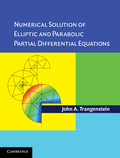Book contents
- Frontmatter
- Contents
- Preface
- 1 Introduction to Partial Differential Equations
- 2 Parabolic Equations
- 3 Iterative Linear Algebra
- 4 Introduction to Finite Element Methods
- 5 Finite Element Theory
- 6 Finite Element Approximations
- 7 Mixed and Hybrid Finite Elements
- 8 Finite Elements for Parabolic Equations
- 9 Finite Elements and Multigrid
- 10 Local Refinement
- Nomenclature
- References
- Author index
- Subject index
2 - Parabolic Equations
Published online by Cambridge University Press: 05 May 2013
- Frontmatter
- Contents
- Preface
- 1 Introduction to Partial Differential Equations
- 2 Parabolic Equations
- 3 Iterative Linear Algebra
- 4 Introduction to Finite Element Methods
- 5 Finite Element Theory
- 6 Finite Element Approximations
- 7 Mixed and Hybrid Finite Elements
- 8 Finite Elements for Parabolic Equations
- 9 Finite Elements and Multigrid
- 10 Local Refinement
- Nomenclature
- References
- Author index
- Subject index
Summary
In this chapter we will study finite difference methods for the numerical solution of parabolic partial differential equations. Finite difference methods are simple to describe for problems on rectangular domains, but are difficult to extend to general domains or to high order. We will see that explicit time integration of these methods will lead to severe restrictions on the timestep for numerical stability, but implicit treatment will require the solution of large sparse systems of equations. We will also see that finite differences do not easily develop second-order discretizations of Neumann boundary conditions. Our discussions of implicit methods in this chapter will motivate later development of iterative methods for solving linear systems of equations in Chapter 3.
Although we will present the methods in this chapter as finite difference methods, in many cases their origin can be found in finite element methods. For many students, the presentation in finite difference form is easier to understand than finite element discretizations. Students who are familiar with finite element methods may find the discussion in this chapter interesting, because it presents a view of the discretization process that is not typically found in finite element books. In particular, the standard “fully discrete” finite element method using forward Euler time discretization leads to a finite difference method that still requires the solution of a linear system of equations; furthermore, this discretization has a more severe timestep restriction than the corresponding explicit centered finite difference approximation.
Information
- Type
- Chapter
- Information
- Publisher: Cambridge University PressPrint publication year: 2013
